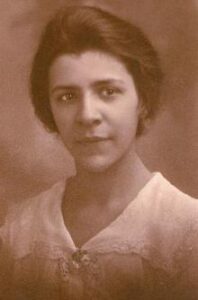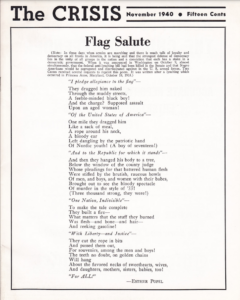They cut the rope in bits
And passed them out,
For souvenirs, among the men and boys!
INTRODUCTION

Harrisburg native Esther Popel (1896-1958) became the first black female graduate of Dickinson College in 1919. She later married William Shaw and worked for most of her adult life as a teacher in Washington, DC. But Popel achieved her greatest national renown as poet and writer, often identified as an example of the dynamic “Harlem Renaissance” from the early twentieth century. The country’s leading civil rights organization, the National Association for the Advancement of Colored People (NAACP) often published Popel’s work in its magazine, The Crisis. The following poem, “Flag Salute,” actually appeared in The Crisis twice, once in 1934, following the lynching of a young black man in Maryland, and then again in November 1940, after the continued threat of filibuster in the US senate seemed to kill off any hopes of passage for a federal anti-lynching bill. Lynching refers to extra-judicial killings, intended as punishment but not authorized by law and usually targeting racial or religious minorities. The US senate did finally pass an anti-lynching measure in 2018, but there was no House action at that time. However, in March 2022, the Emmett Till Anti-Lynching Act finally became federal law.
SOURCE FORMAT: Published poem (full)
WORD COUNT: 204 words
Flag Salute

“I pledge allegiance to the flag”—
They dragged him naked
Through the muddy streets,
A feeble-minded black boy!
And the charge? Supposed assault
Upon an aged woman!
“Of the United States of America”—
One mile they dragged him
Like a sack of meal,
A rope around his neck,
A bloody ear
Left dangling by the patriotic hand
Of Nordic youth! (A boy of seventeen!)
“And to the Republic for which it stands”—
And then they hanged his body to a tree,
Below the window of the county judge
Whose pleadings for that battered human flesh
Were stifled by the brutish, raucous howls
Of men, and boys, and women with their babes,
Brought out to see the bloody spectacle
Of murder in the style of ’33!
“(Three thousand strong, they were!)
“One Nation, Indivisible”—
To make the tale complete
They built a fire—
What matters that the stuff they burned
Was flesh—and bone—and hair—
And reeking gasoline!
“With Liberty—and Justice”—
They cut the rope in bits
And passed them out,
For souvenirs, among the men and boys!
The teeth no doubt, on golden chains
Will hang
About the favored necks of sweethearts, wives,
And daughters, mothers, sisters, babies, too!
“For ALL!”
CITATION: Esther Popel, “Flag Salute,” The Crisis, November 1940 (orig. pub. 1934), available FULL TEXT via Dickinson Archives
DISCUSSION QUESTIONS
- Compare and contrast how Esther Popel confronted the injustice of lynching with how Phillis Wheatley questioned the injustice of slavery.
- What types of details and imagery did Popel employ in this poem to help rouse the fury of her audience?
- Popel’s juxtaposition of the story behind the 1933 Maryland lynching with the recitation of the Pledge of Allegiance hammered home the hypocrisy of American attitudes toward race. What other authors in our curriculum have also pursued this type of rhetorical strategy?
FURTHER READING
- Esther Popel Shaw (1896-1958), Dickinson College Archives
- Esther Popel, Digital Harrisburg (Messiah University / Harrisburg University)
- STUDENT CLOSE READING: By Jordyn Ney (’23)
- STUDENT CLOSE READING: By Etsub Taye (Summer 2021)
- STUDENT CLOSE READING: By Cameron Nye (Summer 2022)
- Handout –Flag Salute by Esther Popel
